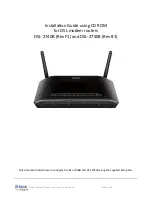
Unified Services Router
User Manual
43
NAT is a technique which allows several computers on a LAN to share an
Internet connection. The computers on the LAN use a "private" IP address
range while the WAN port on the router is configured with a single "public" IP
address. Along with connection sharing, NAT also hides internal IP addresses
from the computers on the Internet. NAT is required if your ISP has assigned
only one IP address to you. The computers that connect through the router will
need to be assigned IP addresses from a private subnet .
Transparent routing between the LAN and WAN does not perform NAT.
Broadcast and multicast packets that arrive on the LAN interface are switched
to the WAN and vice versa, if they do not get filtered by firewall or VPN
policies. To maintain the LAN and WAN in the same broadcast domain select
Transparent mode, which allows bridging of traffic from LAN to WAN and vice
versa, except for router-terminated traffic and other management traffic . All
DSR features (such as 3G modem support) are supported in transparent mode
assuming the LAN and WAN are configured to be in the same broadcast
domain.
NAT routing has a feature called ―NAT Hair-pinning‖ that allows internal network
users on the LAN and DMZ to access internal servers (eg. an internal FTP server)
using their externally-known domain name. This is also referred to as ―NAT
loopback‖ since LAN generated traffic is redire cted through the firewall to reach
LAN servers by their external name.
Summary of Contents for DSR-500
Page 2: ...User Manual Unified Services Router D Link Corporation Copyright 2011 http www dlink com...
Page 117: ...Unified Services Router User Manual 115 Figure 74 Advanced Switch Settings...
Page 136: ...Unified Services Router User Manual 134 Figure 90 Device Status display...
Page 138: ...Unified Services Router User Manual 136 Figure 92 Resource Utilization statistics...
Page 139: ...Unified Services Router User Manual 137 Figure 93 Resource Utilization data continued...
Page 143: ...Unified Services Router User Manual 141 Figure 97 List of current Active Firewall Sessions...
Page 152: ......
Page 156: ......
















































